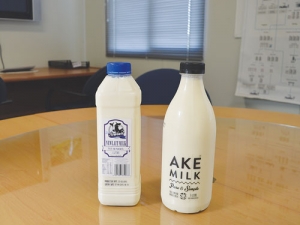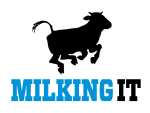Demand for New Zealand fresh milk in China is “exploding”, says independent processor Green Valley Dairy.
However, limited air cargo space is hampering New Zealand’s ability to supply fresh milk, which fetches a premimum price in China.
The South Auckland company processes fresh milk for six companies, supplying six major Chinese cities with 120 million people.
The exporters include Agribusiness New Zealand, a company run by former Federated Farmers chief executive Conor English. The six companies export about 10 tonnes of fresh milk every week.
Green Valley Dairy chief executive Corrie den Haring would not say how much each company is exporting, saying it was commercially sensitive information. But demand is growing in “triple digits”.
He says the fresh milk export business will remain a small part of Green Valley’s business, which includes supplying fresh milk to the domestic market and third-party processing of butter and cream. “In relative terms, this will always remain a small portion, unlikely any more than 10%. Logistically it is not capable of being more than that; there is not enough air [cargo] space available to send 60 tonnes a day – not enough aeroplanes.”
But den Haring says enquiries come in every day despite the product being expensive in China.
Imported fresh milk attracts premium pricing in China: to air freight 1kg of product to China costs $2-$3; other costs are for the base product and import requirements.
While Green Valley Dairy is processing only conventional milk for export to China, it is also looking at organic milk.
Den Haring says it is working with other parties on organic milk, which offers a value proposition out of New Zealand.
“We believe organics will play a part…. more and more Chinese consumers demand to know what products they are consuming; there’s a shift towards greater affinity with the items they consider important – product safety, knowing where it comes from and exclusivity.
“If you are just selling ordinary milk from New Zealand, it could be from any farm, any tanker, any supplier; when you link it back to an organic base, it becomes a little more special and has uniqueness attached to it.” This will help justify the pricing of the end product.
Green Valley is also discussing packaging and branding of organic milk to make it uniquely NZ.
Den Haring says the recent 1080 threat hasn’t affected its business with exporters to China. “It’s interesting to watch and talk to our customers; while a number of consumers were aware of the issue they did not see it as unusual, problematic or risky.”
New production line
Green Valley Dairy is building a new production line and doubling capacity to meet demand. The line will raise processing capability from 120,000L/day to at over 200,000L/day.
Corrie den Haring says it has enough milk, from its own farms and farmer suppliers; milk is also bought from Fonterra under DIRA regulations.
The company gets no more than 30 million L/year from its own supply base; it is entitled to get up to 50 m L from Fonterra.
Den Haring is a proponent of a flatter milk supply curve, compared to New Zealand’s seasonal supply which he describes as “dumb”.
“I’m not telling Fonterra how to run its business but with a consistent supply base they may find they have a less volatile market internationally as well,” he says.











